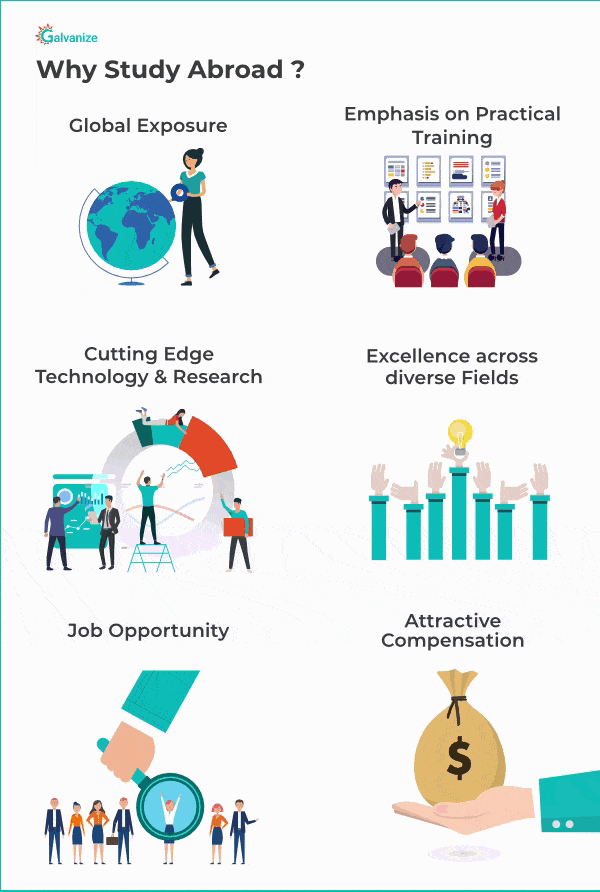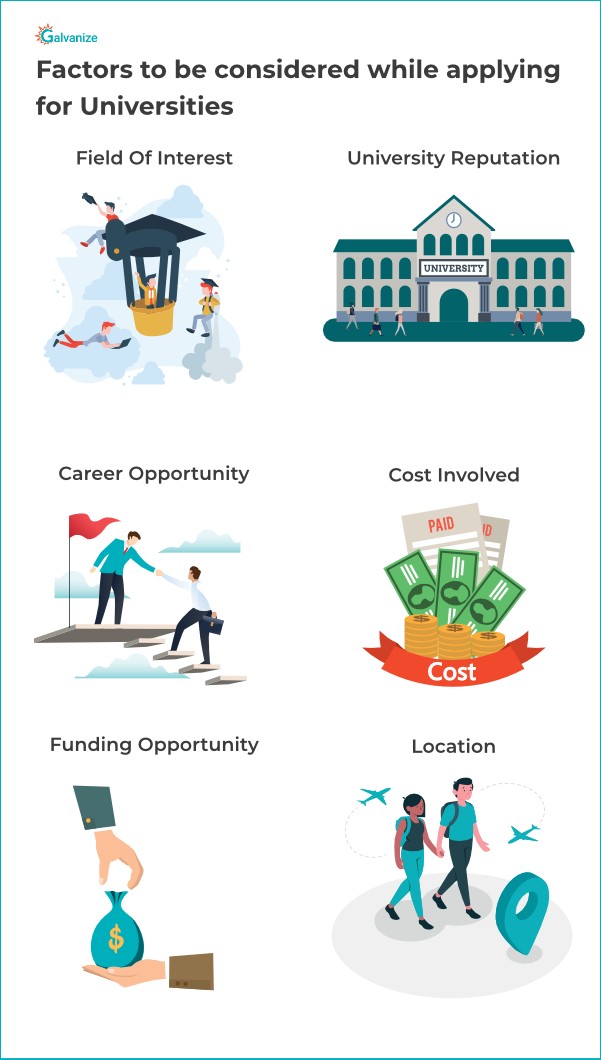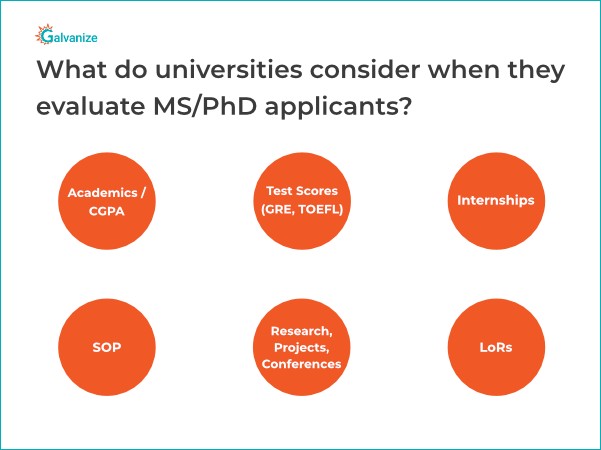

The entire process of study abroad preparation might seem daunting initially, right? Well, you are not alone!
As study abroad experts, we are well aware of the questions that pop up in your mind. “How do I decide on the right destination? How to shortlist universities and programs that would be right for my desired industry and career? What will these universities look at in order to evaluate my profile?” etc.
This and more is exactly what we’re going to cover today.
Table of Contents
Chapter 1
Why study abroad?
6 Reasons Why You Need to Study Abroad:
Wondering why you should go with study abroad plans? No matter if you are going for undergraduate, graduate, or Ph.D. degrees, here are the top 6 valuable reasons you need to know to get the right answer.

1. Global Exposure:
While studying abroad, you’ll definitely interact with students and professors from various countries which will help you grow holistically and transform accordingly. For starters, communicating with students from different cultural and academic backgrounds will help broaden your perspective in terms of how you think and respond. Your thought process and entire outlook toward personal and professional life will become polished and sophisticated because of the exposure to the diversity of thoughts, viewpoints, and styles of a multicultural environment.
2. Emphasis on Practical Training:
In India, due to a lack of ample infrastructure and a strong emphasis on rote learning, most students find themselves lacking the practical knowledge they need to succeed in the workplace.
On the contrary, the situation is different when you study abroad in countries like the USA, Canada, the UK, Australia, and Germany. You’ll have access to better infrastructure which translates to a more hands-on approach to learning as well. These countries nurture a learning environment where you’ll be encouraged to apply the lessons you learn in the classroom in practical settings. Eventually, you will be well-equipped to meet the demands of challenging workspaces.
3. Cutting Edge Technology & Research:
It is a well-known fact that universities abroad have access to the most cutting-edge facilities, world-class infrastructure, and technology. As a student, you can also gain a lot of exposure through these amazing opportunities in universities.
In fact, one of the main reasons most students prefer to do their research or Ph.D. in international universities is because of the availability of advanced technology and infrastructure in these universities.
4. Excellence Across Diverse Fields:
Universities abroad tend to be excellent in multiple programs, not just one or two. For example, if you take good universities abroad they are good not only for engineering but possibly for business and medicine as well. The students also have to option to choose a course based on their needs and preferences. The universities provide field-specific courses to cater to all students like Blockchain Technology, Augmented Reality (AR) and Virtual Reality (VR), Quantum Computing, Bioinformatics, and a lot more.
5. Wide Range Of Job Opportunities:
As a lot of employers today are looking for graduates with international study or work experience, landing your desired job profile would be as easy as a breeze. If you have the right skill set, even if you do decide to return to your home country, you will definitely find better job opportunities here as well. Employers understand the value of a university that has cutting-edge technology and encourages practical learning.
6. Attractive Compensation:
One of the advantages of studying abroad is being greatly compensated for the same. From a survey, it is found that study abroad students earn 20% higher starting salary compared to those who haven’t. This fact makes the investment you put into studying abroad worth it, right?
Even though we have given six reasons to you, the benefits of studying abroad do not stop here. The list is so long that a blog alone cannot explain it.
After going through this blog, we are most certain that by now you might have made up your mind to look into suitable study abroad options.
To realize your study abroad plans, our experts at Galvanize are your best companions. With the experience of actuating the dreams of many students, we can promise you that your journey with us would be smooth sailing.
Chapter 2
Top 5 Exams To Study Abroad
Depending on what you want to study and where you will be required to take one or two tests. So let’s take a look at the top 5 exams taken every year by students that plan on studying abroad.
Do you know that apart from your academic scores, your scores in some qualifying exams are given great weightage by Universities abroad?
In this blog, we will be walking you through the details of these exams. Knowing these details, you can be well prepared ahead of time.
Let’s dive into the details!
GRE – Graduate Record Examination:
This is one of the most popular tests taken by aspirants to study abroad.
The GRE exam is taken by students looking to pursue their Master’s or Ph.D. abroad. It tests you on 3 different skills – Verbal Reasoning, Quantitative, and Analytical Writing skills. You can take the GRE test 5 times a year with a minimum of 21 days between retakes. Here is the complete guide to the GRE exam. If you are planning to take the GRE test to study abroad, start by taking a sample test to see where you currently stand and how to design your preparation.
Grab the free resources for better GRE preparation:
- GRE Practice test
- GRE App specially designed to score high.
SAT – Scholastic Assessment Test:
Want a Bachelor’s from a university abroad? Then you should consider taking the SAT exam to get admission into undergraduate schools. Countries like the US, UK, Canada, and Australia always demand students who wish to study there to take the SAT exam. This study abroad exam measures the student’s ability in 3 areas – Writing, Math, and Critical Reading.
The SAT exam is conducted 5 times a year and you can every chance to attempt it. The SAT scores are valid for 5 years.
Here are the free resources for your SAT preparation:
GMAT – Graduate Management Admission Test:
The GMAT was created in collaboration with the faculty of graduate management programs and is taken by aspirants wanting to get into top business schools abroad. GMAT is designed to test the problem-solving capabilities and analytical thinking abilities of students. These skills, after all, are very important for business management.
The GMAT test is accepted by about 2,100 universities around the world, offering 6,000 programs.
Like the GRE, you can attempt the GMAT test 5 times in a year and you can take the exam to study abroad once every 16 days. However, you are limited to a maximum of 8 attempts in a lifetime.
In addition to Standardized tests like the GRE, GMAT, and SAT, if you’re planning to study abroad and your home country is NOT an English-speaking country (for ex, South-East Asian countries), you have to take an English proficiency test as well.
This is to prove that you have the requisite skills to communicate in English so that you’re perfectly capable of thriving in your host country. After all, how can you be expected to study or work in these countries if you can’t speak English fluently?
The two most popular English proficiency tests are the TOEFL and IELTS.
TOEFL – Test of English as a Foreign Language:
The TOEFL is a standardized exam that tests the English proficiency of non-native English speakers. Countries like the United States, Canada, the United Kingdom, Germany, and Australia accept TOEFL scores for university admissions.
This test is conducted over 50 times a year and you can attempt the test any number of times once in 12 days. In other words, there need to be 12 days between each attempt.
The TOEFL test is different from the GRE t as it is only testing your ability to communicate fluently in the English language. There is no Math section. The TOEFL tests your ability across four areas – Reading, Listening, Speaking, and Writing.
Collect the free resources before you go:
- TOEFL Practice Test to skyrocket your score prepared by experts.
- Addictive gamified Vocabulary App
IELTS – International English Language Testing System:
The IELTS test is another English proficiency testing exam like the TOEFL. Just like the TOEFL, the IELTS mainly tests you on four different skills – Listening, Writing, Speaking, and Reading.
However, the format of the test is quite different. IELTS scores are accepted by every university in many countries like the USA, UK, Canada, and Australia.
This test is conducted many times throughout the year and there is no limit to the number of attempts. IELTS scores are valid for 2 years from the date of the result declaration.
Both the TOEFL and IELTS are equally valid tests of English proficiency.
Chapter 3
Comparing Top Countries to Study Abroad
We’ll compare them in terms of academics and research, career prospects, costs, and scholarship opportunities. When we talk about costs we mean the cost of doing your studies and the cost of living.
When we talk about scholarships, we’re referring to the likelihood of finding scholarships there.
Keeping this in mind, we see there are a lot of advantages for the USA and Canada. In terms of academics, research, and career prospects – the USA is absolutely one of the best countries to study abroad in.
In terms of scholarships, the US leads again because the number of world-class institutes in the U.S. is unmatched by any other country in the world. Germany is also another popular destination preferred by a lot of Indian Students because of their full scholarship option for international students.
Every country definitely has its own top universities. The UK has its top universities – the set of colleges in Oxford and Cambridge.
Every country has a few excellent schools but the number of top universities in the USA is very high.
No other country has an equal number of schools that are in the same league as Harvard, MIT, Stanford, Berkeley, Carnegie Mellon, Georgia Tech, Wisconsin-Madison, Yale, Princeton, University of Chicago, and so on.
Clearly, if you intend to study abroad, you’ll find a lot of options when shortlisting universities for studying in the USA. But on the other hand, the other countries have their own advantages when choosing them as your study abroad destination.
Admissions Counselling
Neil got his dream admit @ Ivy-League University of Pennsylvania. Know how he crafted his perfect SOP.
Take me there!STEM stands for science, technology, engineering, and mathematics – not management. MBA does not come under STEM. In the US when you find a job you can work after your MS for up to three years without requiring any H1B visa or any special visa.
The same goes for Canada also and that is why we have given them four stars in terms of career prospects.
In the UK and Australia, typically they would like you to return to your home country soon after you graduate and then if you want to apply for permanent residency it’s a completely different process that you have to initiate.
In terms of costs, Singapore makes the cut. It is less expensive and of course, the U.S. is more expensive compared to other Study abroad destinations on this list.
In terms of the likelihood of finding scholarships, nothing beats the U.S. and to some extent Canada.
Keep in mind, different countries have different rules. For example in Singapore if you study in certain fields and if you were to sign a bond saying that you will continue to work in Singapore for two to three years after you finish your degree, then they will actually waive your tuition fee or a large part of it.
Different countries and universities have their own rules and regulations but on the whole, this is one good way to compare all of these different places.
Chapter 4
How To Shortlist Universities
One of the most common dilemmas for students before studying abroad is the processes involved while shortlisting desired universities. The important factor is, alongside this, you must also consider the universities’ criteria in admitting students. Both sides of the equation are important.
So, in this blog, we will take you through the factors you should focus on while shortlisting universities.
Let’s dive into the details!

1) Field Of Interest:
When we say the field of interest it means the area in which you want to specialize in your Master’s or Ph.D. program. This has to be something that you’re really interested in. It doesn’t matter for what reason you got into your program in your undergrad, even if you were under a lot of mental pressure – make sure that the field of interest that you pick for your Masters is something that you really care about.
You’re going to spend two years focused on one subject area which might just have been one of six subjects in one semester in your undergrad. So for example, if your undergrad has six subjects every semester, and one of them is networking, in your Master’s you’ll be spending at least half of your two years entirely on this subject. So, make sure your chosen subject is the one which you are passionate about.
2) University Reputation:
The brand of the university is going to stay with you for life. However, it is common that somebody else’s ‘ambitious’ option might be ‘safe’ for you and you’re ‘ambitious’ might be somebody else’s ‘safe’. So you should aim to get the best universities that suit your profile.
At the same time, the reputation of your department is also important.
For example, if you take the University of California-San Francisco, it is not ranked very highly in terms of engineering courses but for anything related to medicine or biology, it’s one of the best places to study abroad.
3) Career Opportunities:
Before opting for any University, you should do some research and know that there are good opportunities to work afterward and utilize the learning that you’ve gotten in your Master’s.
All the companies that hire in your desired field give much importance to where you have studied., and they’re aware of its reputation. In essence, choosing the right university that is best suited for your profile is critical in deciding your career prospects.
4) University Location:
Location is also another deciding factor. For example, if you take a look at San Jose State University, it’s not very highly ranked but it’s located in the heart of Silicon Valley which will offer you a sea of job opportunities. So if you know that you want to work in a technical space, opting for this University could go a long way toward helping you reach your goal.
5) Cost Of Study and Funding Options:
In general, there is no exact figure that tells you the cost of studying abroad. These expenses normally vary based on the country you choose to study.
To give you a rough idea, we have curated this table of the estimated cost of studying abroad in different countries.
| Destination | Undergraduate Program (annually) | Postgraduate master’s degree (annually) | Doctoral degree (annually) |
| USA | USD 20,000 to USD 40,000 | USD 20,000 to USD 45,000 | USD 28,000 to USD 55,000 |
| UK | £10,000 to £20,000 | £10,000 to £20,000 | £15,000 to £24,000 |
| Canada | CAD 13,000 to CAD 20,000 | CAD 17,000 to CAD 25,000 | CAD 7,000 to CAD 15,000 |
| Australia | AUD 15,000 to AUD 33,000 | AUD 20,000 to AUD 42,000 | AUD 20,000 to AUD 42,000 |
Say that you can manage these costs through personal funding or educational loans. On top of that, most of the universities abroad have their own scholarships which can act as a helping hand to meet your study expenses.
However, please be aware that scholarships are not everyone’s cup of coffee. To avail of the scholarship benefits, you must establish and prove to the University that you are a truly deserving student. Your academic profile, extra-curricular activities, financial status, your future goals, and a lot of similar criteria will be carefully checked before granting you the scholarships.
Now, let’s turn the tables and analyze what most top universities consider while evaluating Undergraduate, Master’s, or Ph.D. applicants.
Chapter 5
Factors Universities Consider when Evaluating
1) Academic Credentials:
The first aspect universities want to know about is your academics. Your transcripts, GPA, and academic credentials are the documents the universities rely on for this.
Even though a high GPA is very much appreciated, having a low GPA with good scores in your desired specialization will also save your admissions in some cases. You can always make a case for that. You can explain the circumstances that led to a lower GPA. But please keep in mind that your academics are a very very important part of your study abroad application.
2) GRE Scores and Universities:
Standardized test scores are very important for study-abroad universities. You might wonder what the big fuss is with GRE and TOEFL scores and universities.
The reason study-abroad universities place such an emphasis on standardized test scores is that they help universities compare students from very different backgrounds.
For example, let’s say Student A studied at the University of China and Student B at an IIT. How do you compare these two students both with a 7.5 GPA but in very different academic systems?
This is where standardized tests come in. This is why there is so much focus on getting the right GRE scores for universities. They are conducted in a uniform manner throughout the world and therefore it allows universities to compare apples to apples. Students who attempt the GRE from any part of the world can be compared with other GRE test takers because the test is the same for all.
3) Internships:
In addition to these two factors – academics and test scores – the next aspect Universities look at is your internships. Those of you who are still in your undergrad make sure you do meaningful internships.
Generally, we encourage you to take your GRE as quickly as possible. This will allow you to free up your summers between years. Between your third and fourth year is the ideal time to do meaningful internships.
We don’t mean implant training and things like that. By ‘meaningful’ we mean an internship where you make solid contributions to the organization. You should be able to get a strong recommendation letter that outlines what you did on the project and the impact that it made on the organization.
It need not be a company, it could even be an internship at a research lab or with a professor.
4) Research Work:
Any kind of research work, projects, conferences, workshops, or paper presentations – will be supremely helpful. The more prestigious the journal that you’re published in, the better.
Finally, you have two sets of essays to think about. The SOP is your Statement of Purpose and typically three Letters of Recommendation or LoRs.
5) Statement of Purpose:
A statement of purpose is a one-one and a half page essay that you write with the aim of distinguishing yourself from other applicants. A statement of purpose (also called a letter of intent or a research statement) introduces your interests and experience to the admissions committee.
For more professionally-focused graduate programs, your statement of purpose will primarily discuss how your pursuit of this professional program relates to your past experiences, and how you will use the skills from the program in your future career.
A statement of purpose for grad school is also where you sell the admissions committee on why you belong in their program specifically. Why do you fit there, and how does what they offer fit your interests?
6) Letter of Recommendation:
Your letters of recommendation are the only time you have to get other people’s professional opinions about you. Letters of Recommendation-LoR work for you when they present you in the best possible light, showcasing your skills and abilities.
It’s important that you get them from the right people so they have the greatest impact.
Here’s a quick Summary:
- Reasons to study abroad:
- Global Exposure
- Emphasis on practical training
- Cutting edge technology
- Excellence across diverse fields
- Job Opportunities for study abroad students
- Attractive Compensation: study abroad students earn 25% higher starting salary compared to those who didn’t study abroad
- There are different exams that one would have to take depending on the country they want to study in:
- GRE: GRE is taken by students who wish to do their Master’s/Ph.D. abroad
- GMAT: Taken by aspirants who want to study in top business schools. You are limited to 8 attempts in a lifetime
- TOEFL: This tests your ability to communicate fluently in English: And is accepted in the US, UK, New Zealand, and so on.
- IELTS: It is similar to TOEFL and tests you on your English language and is accepted by most universities in the UK, Canada, and Australia
- SAT: Students trying to get admission into undergraduate schools take this test. It tests the students on Writing, Math, and critical reading
- USA tops the list when it comes to academics, research, career prospects, and scholarships!
- In the US when you find a job you can work after your MS for up to three years without requiring any H1B visa or any special visa.
- Different countries have different rules and different procedures for getting tuition fee waivers and permanent residencies
- It’s really important that you pick your field of interest when it comes to selecting a specialization for your master’s
- Factors to consider while applying for a university:
- Field of interest
- University Reputation
- Career Opportunity
- Cost Involved
- Funding Opportunity
- Location
- What do universities evaluate when they evaluate MS/Ph.D. Applicants
- CGPA
- Test Scores
- SOP
- Internships
- LORs
- Research/projects/conferences
Other Useful Links:
- [FREE GRE Email Course] Discover the Hidden Tips & Strategies Recommended by the Pros to Dominate the GRE.
- [FREE Admissions Email Course] World’s Top Admissions Consultants have Built this Course to Get You into Top High Schools of your Choice!
- [Galvanize Events] Attend Galvanize Powered Webinars for FREE.
- [GRE App] Get the most awesome GRE practice app with 100’s of GRE style questions, excellent explanations, GRE Score Predictor & more!
- [Vocab App] The Ultimate Vocabulary Builder is a unique learning tool: far from being forced to study a long and boring list of English words, here you will experience a gamified vocabulary journey.
- FREE GRE Sample Test
now it's your turn
I'd like to hear from you
Which strategy from today’s guide do you think will work best for you?
Are you feeling more sure of how to shortlist universities for MS now?
Or maybe you’re ready to start shortlisting some of the best universities in the world.
Either way, leave a comment below right now.















Great info!
ok
Very useful
Greatly done
Very helpful
Awesome post!
I was looking for this. Thanks
Nice work
Excellent
ok
Very useful info from GRE preparation to Joining best colleges. Thank you very much!
Nice
Helpful information
nice post shared.
I’m interested in applying for fall 2021 to US and Europe based Univs.
On what parameters does getting an admit with or without scholarship vary?
Gets my head straight.
Really useful information,
Cleared all my doubts.
good stuff.
Accurate summary of all one needs to know about education in abroad.
thank you very much for the info. quite insightful.